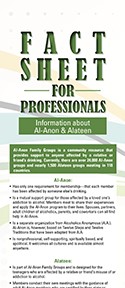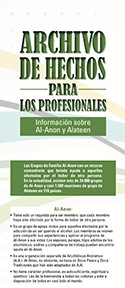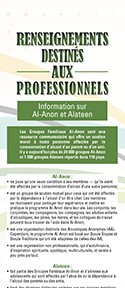Resources for Professionals
Al-Anon is a mutual support group of peers who share their experience in applying the Al-Anon principles to problems related to the effects of a problem drinker in their lives. It is not group therapy and is not led by a counselor or therapist. This support network complements and supports professional treatment.
Alateen is a peer support group for teens who are struggling with the effects of someone else’s problem drinking. Many Alateen groups meet at the same time and location as an Al-Anon group. Alateen meetings are open only to teenagers. Alateen is not a program for young people seeking sobriety.
No advance notification or written referral is necessary to attend an Al-Anon or Alateen meeting. Anyone affected by someone else’s drinking is welcome to attend.
There are no dues or fees. Groups are self-supporting, and usually pass a basket around for a voluntary contribution to pay for rent or Al-Anon literature.
Encourage your clients to try Al-Anon, even if they minimize the problem with alcohol. The 2015 Al-Anon membership survey shows that 40% of newcomers who first came to Al-Anon because of a loved one’s drug addiction and later came to better understand the seriousness of that person’s alcohol problem only after attending Al-Anon for a period of time.
A Professional Feels Challenged
Tradition Eight: Al‑Anon Twelfth Step work should remain forever non-professional, but our service centers may employ special workers.
83% of Al-Anon members report improvement in mental health within first year
83% of Al‑Anon members report improvement in mental health within first year Participation in Al‑Anon meetings can have
The impacts of growing up with the family disease of alcoholism
Perspectives from Al‑Anon Members & Professionals The impacts of growing up with the family disease of alcoholism
You can help a child affected by someone’s addiction to alcohol
Professional Perspectives interviews discuss the trauma experienced by family members of drinkers and how Al-Anon and Alateen family groups can help.
Four things you can do to help children & teens living in a family affected by alcoholism
One in 10 children live with at least one parent who had a past year alcohol use disorder.



